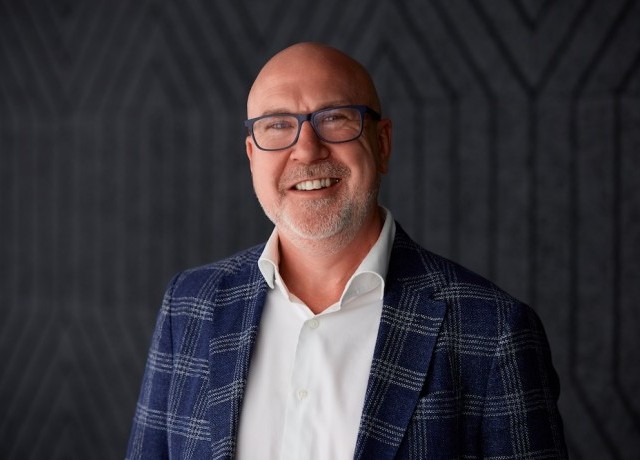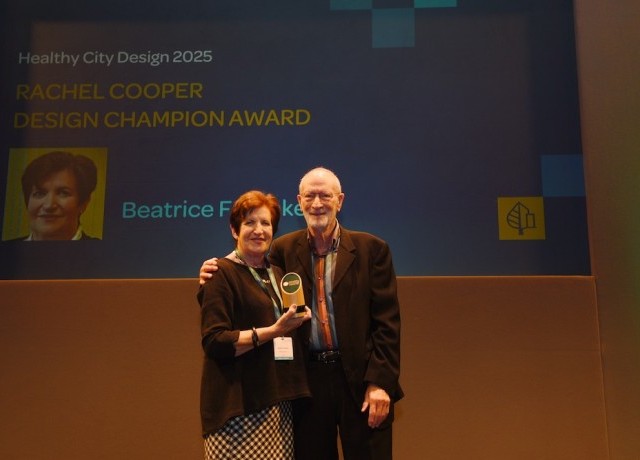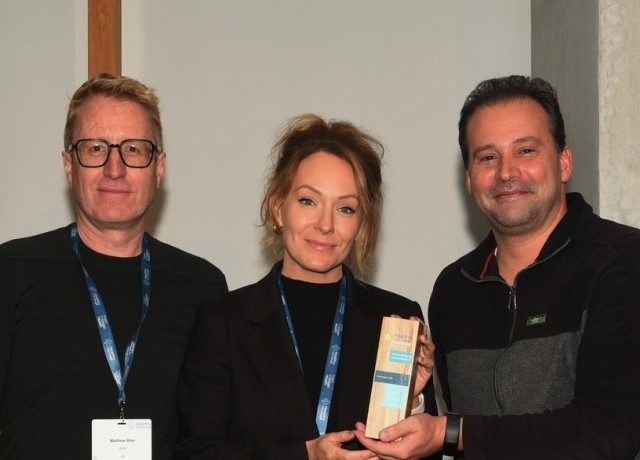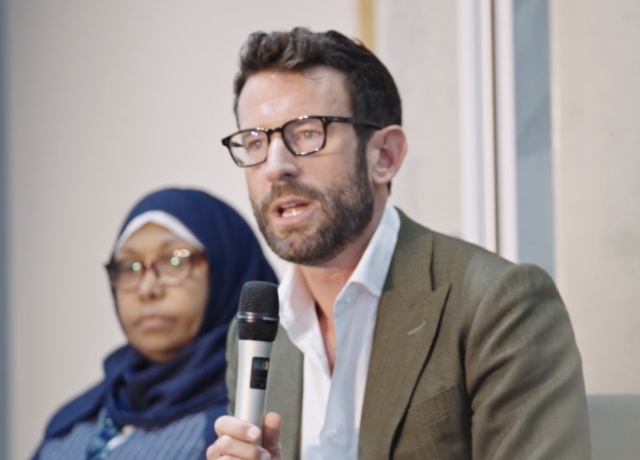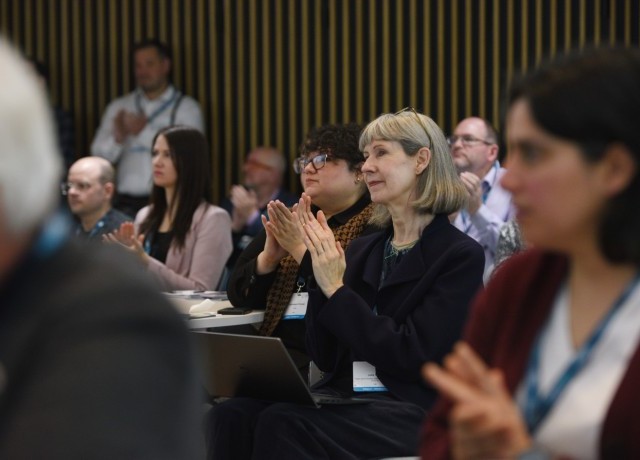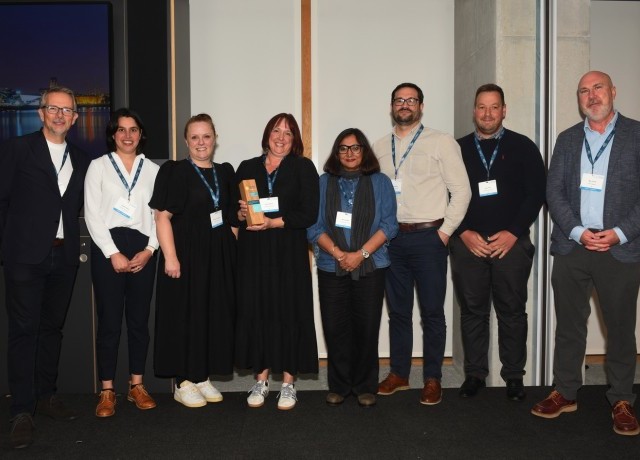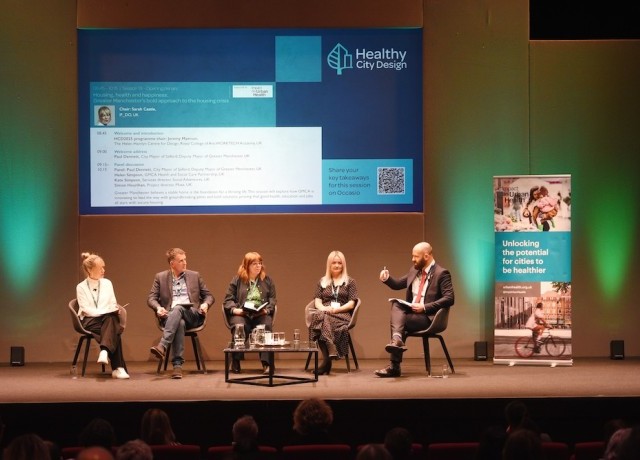
Housing and health – where building blocks for a good life are created
With the UK and many other countries facing a housing crisis in affordability, supply – and quality – the keynote session on day two of Healthy City Design 2025 sought to unpack how housing can be a positive health intervention, a climate solution and a catalyst for social justice.
Chairing the session, Sarah Castle, co-founding director of architectural practice IF_DO, described Greater Manchester’s approach as radical – one that treats secure, stable housing “as a foundation for wellbeing, health intervention and a springboard for opportunity,” and one that leads to “better health outcomes, stronger communities, and more resilient futures”.
Presenting the strategy ahead of a panel discussion, Helen Simpson, from GMCA Health and Social Care Partnership, described the approach as a “social model for health rather than a predominantly medical model”, and the driver for implementing it is “the recognition that good health isn’t created in our hospitals and healthcare settings; it’s in our communities, in our behaviours and lifestyles. It’s about social connections, meaningful work, and relationships.”
She continued: “It’s about supporting good work and employment opportunities and ensuring within that that we have a sustainable workforce. And it’s also about a health system that plays a part in tackling poverty and long-standing inequalities.”
No doubt, Greater Manchester has been helped in delivery of the proactive model by its devolution journey. The Health and Social Care Devolution Deal, agreed in 2015, gave the region “the system, the flexibility, the powers and the investment” needed to focus on where it should direct resources to create good health in the population, “not just fixing things when they go wrong”.
Tripartite agreement
And in service of this approach, there is a well-established relationship in Greater Manchester between key partners that operate in housing and health. “NHS Greater Manchester is our integrated care partnership,” noted Simpson, working alongside “Greater Manchester Combined Authority and the ten local authorities, and Greater Manchester Housing Providers – 26 of the biggest housing provider organisations operating in the city region”. All of which is underpinned by a tripartite agreement, which, explained Simpson, gives NHS Greater Manchester “a mechanism to work alongside, influence and engage with the housing sector and implement joint activity that improves the health of Greater Manchester residents. And for the housing sector, a real opportunity to integrate itself into health and social care delivery and demonstrate its impact beyond what we would traditionally consider to be its core functions.”
The work captured in the agreement rests on a joint understanding of the impact that housing can have on the health of a population – that home is the place where many of the building blocks for a good life are created, but a recognition, too, that for some, their housing situation is a factor in making them sick. When deciding on possible interventions, the partners consider a range of issues – from the condition of homes, such as exposure to cold, damp, mould, and falls caused by slip and trip hazards; to the security of living in any precarious housing circumstances, such as homelessness, rough sleeping, temporary accommodation, or overcrowding; to the suitability of homes, for example, whether they are accessible and suit the needs of residents in the present and as they age; to the provision of support, including the alignment of the right health and care interventions in the home and the community.
There are other instruments, too, which work towards similar aims. Acknowledging that a healthy, safe place to call home is the cornerstone to a healthy, happy life, a new Greater Manchester Strategy sets a healthy home for all as a foremost pledge. There is the region’s ‘Housing First’ programme, which looks to provide permanent housing and long-term support for individuals experiencing homelessness with complex needs. The new NHS Ten-Year Plan also feeds into this agenda, setting out a national vision around three shifts: hospital to community; analogue to digital; and sickness to prevention. “We’re already aligning our existing work around housing into this model, focused on community and the left shift towards prevention,” said Simpson. And there is also the opportunity for Greater Manchester to develop as a Prevention Demonstrator – leading on delivery of the Ten-Year Health Plan, using all of its devolved powers to go beyond a neighbourhood health service “to meaningfully realise ambitions around true public-sector prevention in a place” and “integrating health with other public services”.
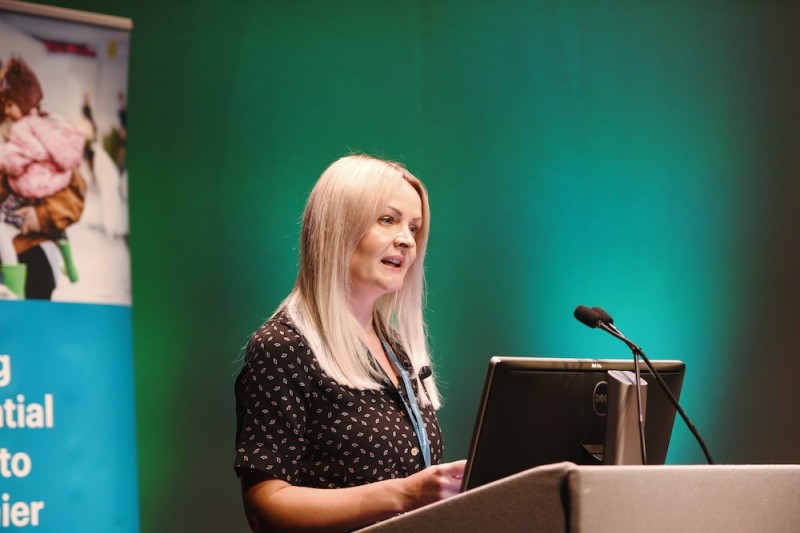 Helen Simpson, from GMCA Health and Social Care Partnership, sets out Greater Manchester’s approach to housing and health
Helen Simpson, from GMCA Health and Social Care Partnership, sets out Greater Manchester’s approach to housing and health
Wraparound services, affordability and trust
Speaking as part of the follow-up panel discussion, Paul Dennett, city mayor of Salford and deputy mayor of Greater Manchester, dug deeper into Housing First – an initiative that takes learnings from Finland on how to deliver wraparound services around housing. “The impact of that has been phenomenal in Greater Manchester,” he enthused. “People have sustained tenancies and gone on to have their own tenancies outside of Housing First, but that relationship between health and housing and the services that wrap around the house can absolutely transform a person’s life.”
He also pointed to the ‘A Bed Every Night’ initiative and the funding the regional authority has received from integrated care boards towards ensuring no one needs to sleep rough on the streets of Manchester. Said Dennett: “We know drugs and alcohol can sometimes be a driver of homelessness, but it can also be a consequence of finding yourself in that situation. So, it’s important that we acknowledge that reverse causality that’s going on here.”
On the developer side, Simon Hourihan, project director at Muse Developments, spoke about how the company had upscaled its delivery of affordable and sustainable homes over the past few years. This includes several Passivhaus-certified housing schemes, at different stages of development, from a completed site of Greenhaus apartments, to Willowhaus, delivered under the Salford Crescent masterplan; and the Regent Trading Estate, which is still working its way through planning and consultation. “All of those schemes are working with two registered providers of social housing, one of which is Dérive and the other one is Salix Homes,” said Hourihan. “So, we’ve delivered lots of homes to masterplans over the years, but we’ve changed the emphasis on the affordable element and the highly sustainable element over the last three years.”
Then, providing an emotional pillar of support is co-operative and social organisation Social adVentures, whose service director, Kate Simpson, commented: “Housing is often a barrier to people getting well. It’s often something we have to work with before we do anything else. People tell us that if they can’t have a safe and secure home, then they can’t start tackling other health issues that they have. These services start with trust, and the third sector gives that.”
But clinical services can also be an obstacle for some, maybe due to fear or feeling they’re being judged. “What we’ve done is built a service where we’re bringing people into a warm hub, giving them a hot meal, and then gradually introducing them to other services as they build the trust with their teams,” she said. “That’s led to uptake in things like diabetes programmes, weight-loss programmes, healthy eating.”
People tell us that if they can’t have a safe and secure home, then they can’t start tackling other health issues that they have
Barriers and hurdles
For Hourihan, there is a degree of managing expectations. “Everyone wants everything,” he said, and this in itself can be a barrier to achieving successful outcomes if delivery is not pinpointed at where the greatest impact can be made. “If you look at the operational energy use at Greenhaus, and the air quality that that scheme delivers, that trumps embodied carbon and, say, biodiversity net gain.
“It doesn’t mean we’re not interested in embodied carbon and biodiversity net gain, but if you look at the impacts on the residents, the heating and hot water demand at Greenhaus is 68 per cent less than typical new build built to building regulations at the time. So that’s having a direct impact on residents in terms of fuel bills. And the air quality in the apartment through the Passivhaus design standard will be the highest of virtually any residential development in the UK. That will be having a direct impact on the quality of life for residents from the day they move into their apartment.”
Another barrier is the skills and experience to deliver healthy and sustainable housing. On Greenhaus, it was “literally learning on the job”, said Hourihan. “All our architects knew what [Passivhaus] was; it’s a 30-year established design standard. But none of them had experience of upscaling it to a medium-rise, city centre residential development, such as Greenhaus. So, we were working from a standing start, and we had to muddle our way through that.
“That is a barrier. Simple things like getting into contracts in a commercially acceptable way to a developer like Muse, so it can deliver schemes to that certified standard, is really difficult.”
One solution, suggested by Dennett, is to embed industry more deeply within universities, “driving the curriculum, driving the teaching programmes, and ultimately driving forward our economy”. And medium- to long-term workforce planning needs to look beyond electoral cycles, he added.
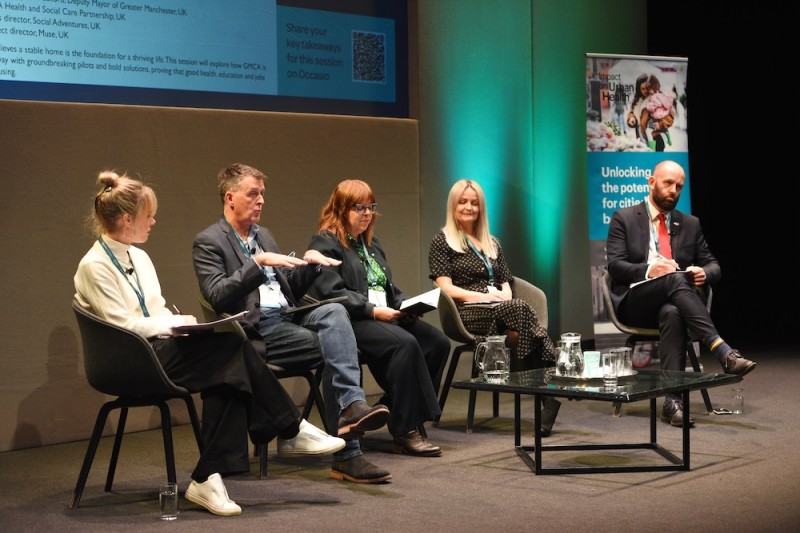 (L to R): Sarah Castle, IF_DO; Paul Dennett, City Mayor of Salford; Deputy Mayor of Greater Manchester; Helen Simpson, GMCA Health and Social Care Partnership; Kate Simpson, Social adVentures; Simon Hourihan, Muse Developments
(L to R): Sarah Castle, IF_DO; Paul Dennett, City Mayor of Salford; Deputy Mayor of Greater Manchester; Helen Simpson, GMCA Health and Social Care Partnership; Kate Simpson, Social adVentures; Simon Hourihan, Muse Developments
Further challenges
There are other areas, too, troubling Dennett, including the absence in the National Planning Policy Framework of any mechanism for land value capture. “Affordability is detailed as 80 per cent of market value, having no relationship with the labour market, household income or welfare – it’s hugely problematic when it comes to the delivery of affordable housing.”
Taking issue with the assumption that local government is awash with land assets, he added: “We’ve been using our land assets to tackle austerity over the last 14 years, and if you look at who actually owns land in the UK, you’ll find aristocracy, corporations, oligarchs, and bankers probably own far more land than local government does, so maybe we need to start there.”
And a further bugbear is local government financing and how public capital is allocated. “It can’t continue to flow into London and the South East at the expense of everywhere else, because that’s where we see a buoyant market,” he stressed. “That is not an inclusive economy and that is not strategic industrial planning either.”
Kate Simpson agreed that funding, generally, is a problem, pointing to there still being “some greed in the system”, such as the rent charged to NHS bodies, and the amount distributed to shareholders.
“The money is under so much pressure to go into other things,” she said. “Services that I’ve seen cut recently, like Community Connectors in our Wellbeing Matters programme – a service that connects people in the community with services that are on their doorstep and makes them stronger and more able to access services themselves. And it’s not that the service is not doing well, it’s a lack of money or where the money is coming from that has changed.”
Strong foundations
For all these barriers and challenges, there is a sense that Manchester is getting the basics right, and, according to Helen Simpson, “staying wedded to those as the foundation for everything we do going forward” should stand it in good stead.
She continued: “Whether that’s about intervening in poor-quality homes, where we know that they’re exacerbating or creating poor health outcomes; whether that’s about building homes that are connected to the right social infrastructure, that they’re affordable and are able to respond to the needs in our population; whether that’s about how we commission services that are inclusive, accessible and are the services that people need.
“There’s something about how we operate as three partner organisations within a single system that supports one another at that foundational level, which is about what partners do as part of their day jobs. And we can see and track the impact that is having on the health and wellbeing of the community.”
Presenters

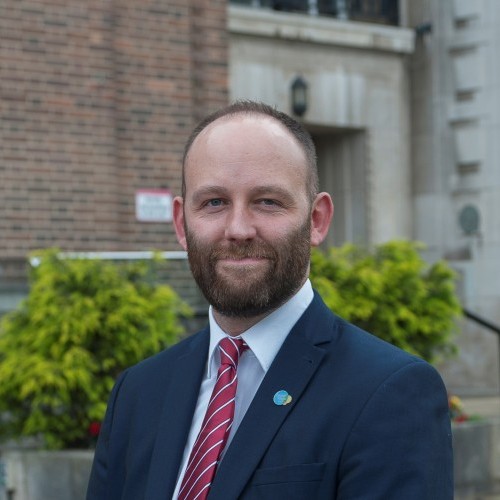



Organisations involved
Event news
Inclusive neighbourhood parks and resorts
20th November 2025
Connected futures: Regenerating Trafford and Salford together
20th November 2025





